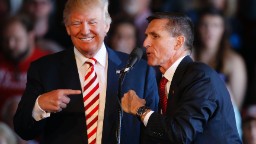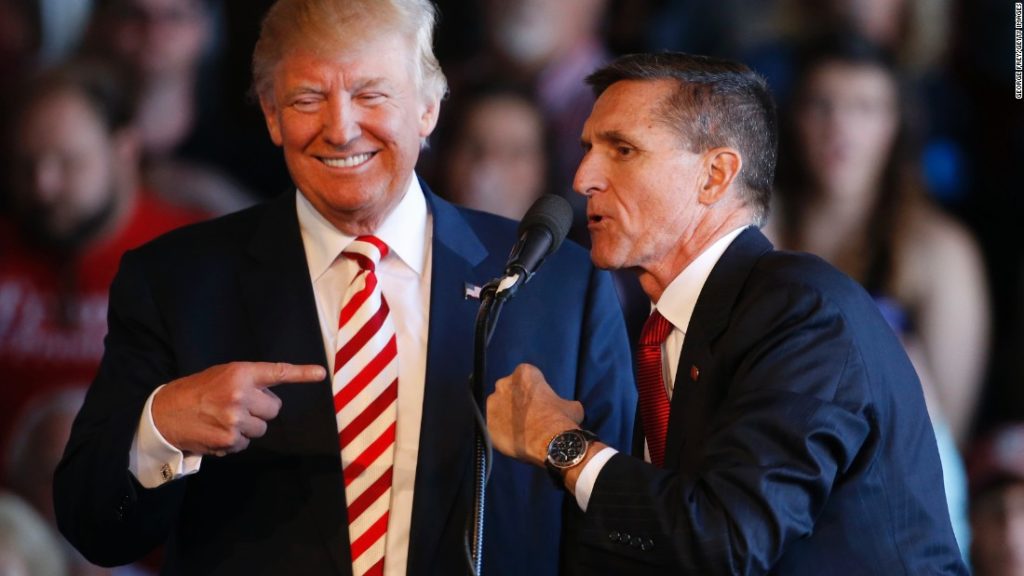
Flynn’s rise, fall and — sort of — reclamation — function as fitting bookends of Trump’s four years in the White House, a testament to the hubris, loyalty and borderline lawlessness that sit at the heart of the most radical presidency in modern history.
That Flynn wound up in the Trump White House at all is telling.
Trump’s adoration of the military coupled with his desire to cast himself as the exact opposite of Barack Obama in every possible way drew him to Flynn. And Flynn delivered. After a somewhat low-profile career in intelligence, Flynn suddenly blossomed as a hard-edged partisan — willing to say almost anything about Democratic presidential nominee Hillary Clinton, and anyone else who got in Trump’s way.
By the end of the 2016 campaign, Flynn was Trump’s preferred warm-up act at the raucous rallies he held all over the country. He knew how to stir the crowd to a boil — and Trump loved him for it.
“He didn’t tell the vice president of the United States the facts and then he didn’t remember, and that’s just not acceptable,” Trump told reporters by way of explanation. “I fired him because of what he said to Mike Pence.”
“According to an FBI statement, Flynn communicated with then-Russian Ambassador to the US Sergey Kislyak after being asked by a senior Trump transition official to find out how foreign governments stood on a coming UN Security Council resolution about Israel. The prosecutors did not name any transition officials.”
In the wake of Flynn’s guilty plea, Trump changed his story almost immediately.
So, did Trump fire Flynn because he had lied to Pence? Or the FBI? Both?
While that question lingered, Flynn largely dropped off the radar. He was cooperating with Robert Mueller’s investigation into Russian meddling in the 2016 election and the possibility of collusion between the Trump campaign and the foreign government.
Suddenly, Flynn was, again, a cause celebre in Trump’s world — an innocent man done wrong by reckless and out-of-control investigators and prosecutors desperate to enforce their own political agendas. There was never any evidence that those involved in Flynn’s guilty plea acted in any sort of unethical manner. But that didn’t deter Trump.
For Trump, Flynn was the poster child of “deep state” persecution. Flynn’s life had been ruined, in Trump’s telling, by partisans hell-bent on damaging his presidency. For Trump, Flynn was an innocent victim of a much broader conspiracy against him.
That story, of course, overlooked the fact that Flynn had — just as a reminder — pleaded guilty to lying to the FBI and cooperated with Mueller’s investigation. And had done so under oath. On more than one occasion.
Seen through that lens, Trump’s decision to offer a full pardon to Flynn on his way out of the White House makes perfect sense. Trump sees his own story in Flynn. Both men were loathed by the political establishment, outsiders because they wouldn’t play by the accepted rules of a corrupt bureaucracy. They were punished for their loyalty, for their unflagging belief in their own righteousness. They are the real victims here — of a power-obsessed establishment scared to death of losing its grip on the levers of government.
Trump and Flynn have more in common than either is likely willing to acknowledge, too. Both played fast and loose with facts, and pushed hard against the boundaries of acceptable (and legal) conduct.
You may also like
-
UK coronavirus variant has been reported in 86 countries, WHO says
-
NASA technology can help save whale sharks says Australian marine biologist and ECOCEAN founder, Brad Norman
-
California Twentynine Palms: Explosives are missing from the nation’s largest Marine Corps base and an investigation is underway
-
Trump unhappy with his impeachment attorney’s performance, sources say
-
Lunar New Year 2021: Ushering in the Year of the Ox

